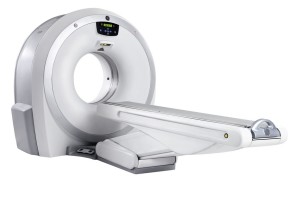
Magnetic resonance imaging (MRI) is a non-invasive medical procedure using strong magnetic fields and radio waves that produce cross-sectional images of organs and body structures to help diagnose and treat medical conditions. MRI can be used to visualize organs, soft tissues, bone, joints, cartilage, and many internal bodily structures. It is often utilized to aide in diagnosing, monitoring, and/or treating conditions related to tumors, hepatic abnormalities, reproductive organs, lymph nodes, heart problems, injuries of bone and joints, and more.
MRI does not use ionizing/high-energy radiation and there are no known harmful side-effects of temporary exposure to strong magnetic field by use of MRI scanner. However, magnet in the MRI may cause pacemakers, artificial limbs, clips used on brain aneurysms, screw or pins, artificial heart valves, amongst other implanted devices to malfunction or heat up during the exam. It is also important to disclose other metals that may be in the body such as bullets, shrapnel, or other metals. Before an exam, patients are asked to remove all materials containing any metal such as jewelry, undergarments, belts, dentures, glasses, piercings, and hearing aids. MRI may or may not include an injection of contrast material, based on the discretion of physicians. If an MRI with contrast is to be done, patients may be asked to obtain a blood test to determine kidney function prior to the exam. You should disclose any allergies to iodine or prior reactions to contrast media to the technician and/or radiologist.
** Please consult with your physician and/or radiologist for detailed instructions or any concerns regarding on how to prepare for your MRI, current and/or past allergies, and other recent illnesses or medical conditions such as kidney diseases before the examination. It is important to inform physicians and x-ray technicians if a woman believe she is or may be pregnant. If you have a fear of enclosed spaces (claustrophobia) or anxiety, please consult with the physician on obtaining a mild sedative before the scheduled exam.